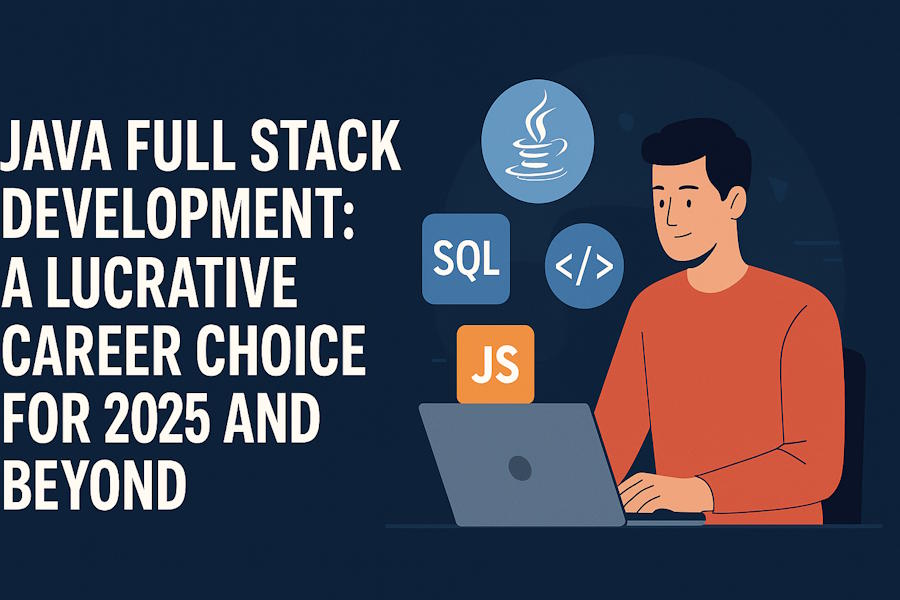As companies quickly embrace digital transformation, one of the most sought-after professional choices is Java Full Stack Development. Full stack Java engineers are becoming more and more in demand as businesses seek out qualified individuals who can manage both front-end and back-end development. Java is the foundation of enterprise applications due to its adaptability, scalability, and strong ecosystem, which guarantees job stability and competitive pay. Developers can secure their professional futures by becoming proficient in critical technologies like as cloud computing, Angular, React, and Spring Boot. The time to investigate Java full stack development prospects is now, regardless of programming expertise level.
Introduction
The ability to use Java and its ecosystem of frameworks and tools to create web applications' front end and back end is known as full stack Java development. A full stack Java engineer is skilled in a variety of technologies, such as databases like MySQL or MongoDB, HTML, CSS, JavaScript (Angular/React), Spring Boot, and Hibernate. Professionals can develop dynamic, scalable, and high-performance applications from start to finish thanks to this adaptability.
For recent graduates looking to break into the tech industry, enrolling in a Java full stack developer course can provide structured learning and hands-on experience in key development tools. Companies across industries, including fintech, e-commerce, and healthcare, seek skilled Java developers to build modern software solutions. As digital transformation accelerates, mastering full stack Java development ensures a future-proof career with high demand, competitive salaries, and global job opportunities.
Essential Skills to Master in Full Stack Java Development
To become a proficient Full Stack Java Developer, mastering a diverse set of technical and soft skills is essential. Below are the key skills required to excel in this field:
Front-End Development
- HTML, CSS, and JavaScript – Core technologies for designing responsive and user-friendly interfaces.
- Front-End Frameworks – React, Angular, or Vue.js for dynamic web applications.
- Bootstrap & Material UI – For mobile-friendly designs and improved UI/UX.
Back-End Development
- Java and Spring Boot – Core programming language and framework for building scalable and secure applications.
- Hibernate & JPA – ORM tools for efficient database management.
- RESTful APIs & Microservices – Developing modular and distributed applications.
Database Management
- MySQL, PostgreSQL – Structured data handling for enterprise applications.
- MongoDB & NoSQL – Managing large-scale unstructured data.
Version Control & Deployment
- Git & GitHub – For source code management and collaboration.
- Docker & Kubernetes – Deploying applications in a cloud environment.
Testing & Debugging
- JUnit, Mockito – Ensuring code reliability with unit testing.
- Selenium & Cypress – Automated testing frameworks for web applications.
By mastering these Full Stack Java Development skills, professionals can secure lucrative roles in the software industry.
Why Java Full Stack Development is a Lucrative Career Choice for 2025?
The demand for Java Full Stack Developers is soaring as businesses prioritize digital transformation, cloud computing, and scalable web applications. Java remains one of the most widely used programming languages, powering industries such as finance, healthcare, and e-commerce. Companies like Amazon, Netflix, and LinkedIn rely on Java-based architectures for their large-scale applications, making Java Full Stack Development a highly rewarding career path.
Why is Java Full Stack Development in High Demand?
- Versatility & Stability – Java is platform-independent, allowing developers to build robust applications for web, mobile, and cloud environments.
- Industry Adoption – Leading enterprises prefer Java for its security, performance, and vast ecosystem of libraries and frameworks.
- Scalability & Performance – Technologies like Spring Boot, Hibernate, and React help developers create high-performance applications.
- Lucrative Salaries – According to Glassdoor, Java Full Stack Developers earn an average of $100,000 per year in the U.S.
With businesses investing in digital innovation, mastering Java Full Stack Development ensures job security, career growth, and global opportunities in 2025 and beyond. Whether working with AI-driven applications, fintech platforms, or cloud solutions, Java Full Stack Developers play a crucial role in shaping the future of technology.
Future of Java Full Stack Developer
Java Full Stack Developers have a bright future thanks to the ongoing development of cloud computing, enterprise solutions, and web applications. Java is a popular option for scalable and secure systems because of its dependability, platform independence, and wide ecosystem.Java Full Stack Developers are in great demand across industries due to the growing use of cloud-native programming, containerization (Docker, Kubernetes), and microservices architecture.
As businesses prioritize digital transformation, professionals skilled in Java frameworks like Spring Boot, Hibernate, and Angular or React for front-end development will have a competitive edge. Companies seek developers proficient in both server-side and client-side technologies to build responsive, high-performing applications.
Enrolling in a Full Stack Java Course can help aspiring developers gain industry-relevant expertise, making them job-ready in this dynamic field. With opportunities in fintech, e-commerce, and SaaS platforms, Java Full Stack Developers will continue to play a vital role in shaping modern web development.
The final thought
Java Full Stack Development continues to be a lucrative career choice for 2025 and beyond, driven by the demand for versatile developers who can handle both front-end and back-end technologies. With Java’s reliability, scalability, and strong ecosystem, professionals skilled in frameworks like Spring Boot, Hibernate, and React or Angular will remain highly sought after. The rise of cloud computing, microservices, and AI-driven applications further strengthens the relevance of Java Full Stack Developers. Enrolling in a Full Stack Java Course can equip individuals with industry-ready skills, ensuring career growth and long-term stability in the ever-evolving tech landscape.








